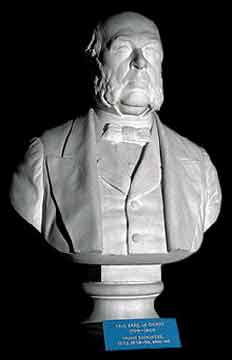Edward G. G. Smith Stanley, 14th Earl of Derby (1799-1869)
Conservative Prime Minister 1852, 1858-1859, 1866-1868
© 2007
Armchair Travel Co. Ltd. - This page may be used for non-commercial purposes
ONLY!
![]()

[ Play
Narrated and Animated Movie ! ] To threaten and not act upon it was too often tried formerly, and was also a maxim of Lord Derby, who was the most difficult and unsatisfactory minister I, or indeed anyone, had to deal with.
Having been born into a staunchly Whig, old aristocratic family Edward Stanley became the Whig member of Parliament for Stockbridge from 1822-1826. He was noted for his oratory and debating skills, and became Lord of the Treasury in the Canning Ministry of 1827. By 1830 Stanley was made Chief Secretary for Ireland, but quarrels and controversy over the Irish church reform led to his resignation in May 1834 - the 'Derby Dilly' group. This resignation marked the beginning of his shift towards the Tory cause.
Stanley joined Peel's Conservative Party, taking the post of Colonial Secretary in 1841. In 1844 he was elevated to the Lords as Baron Stanley, and became leader of a group of Lords called the Protectionists. He spent the next six years leading the Opposition during Russell's Whig ministry. He succeeded as the 14th Earl of Derby on the death of his father in 1851.
In 1852, after Palmerston's defeat of Russell over the Militia Bill, Queen Victoria asked Derby to be Prime Minister. Unfortunately, his was a very weak ministry and it was defeated after only 10 months. Derby turned down the opportunity of office in 1855 on the collapse of Aberdeen's government. However, after Palmerston's fall in 1857, Derby readily took up the opportunity of a second ministry. He successfully abolished property qualifications for members of the Commons, transferred the government of India from the East India Company to the British Crown, and settled disputes with France. His government was defeated again in 1859, being replaced by the Whigs under Palmerston.
For the next seven years, Derby led the opposition. With Russell's defeat over Gladstone's Reform Bill (July 1866), Derby became Prime Minister for the third time. Disraeli was appointed as his Chancellor of the Exchequer, and between them they formed and passed through Parliament the second Reform Bill. Only six months later in February 1868 Derby resigned due to ill health. He died in October of the following year.
Derby must be noted for his political inconsistency. During over fifty years in Parliament he had been a Whig, Peelite, Protectionist and Conservative! Derby was a highly intellectual individual and his literary achievements included translations of ancient and modern poetry and a complete translation of Homer's Iliad.
In London he is one of the great political leaders, and the second orator in the House of Commons; and here he is a lively rattling sportsman, apparently devoted to racing and rabbit-shooting... If one did not know what his powers are, and what his position is, it would be next to impossible to believe that the Stanley of Knowsley, is the Stanley of the House of Commons.
[ Virtual
Tour ] [ Main Topics
Index ]
- Queen Victoria, Letter to Lord Granville, 1880.
Additional Information on
Edward G. G. Smith Stanley, 14th Earl of Derby (1799-1869)
Conservative Prime Minister 1852, 1858-1859, 1866-1868
QUOTATIONS
- Charles Greville, Diary, 1835.
Explore-Parliament.net: Advanced Category Search
Keyword Categories:
_Object_Portrait
_Object_Artwork
_Object_Sculpture
_Peer
_Man
_Person
_Politician
_Consort
_Artist_Gleichen
_Derby